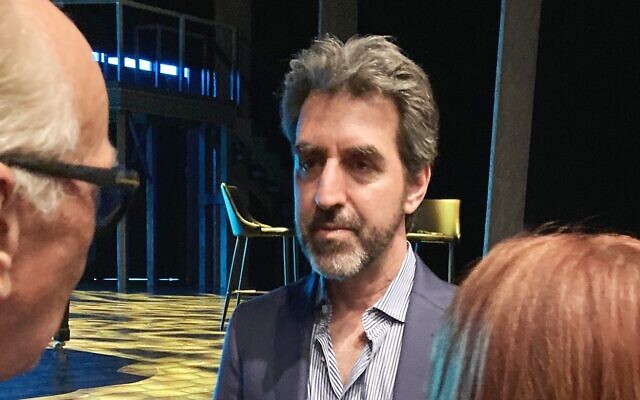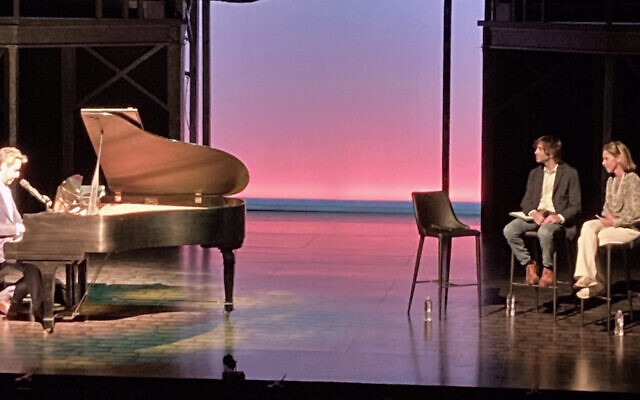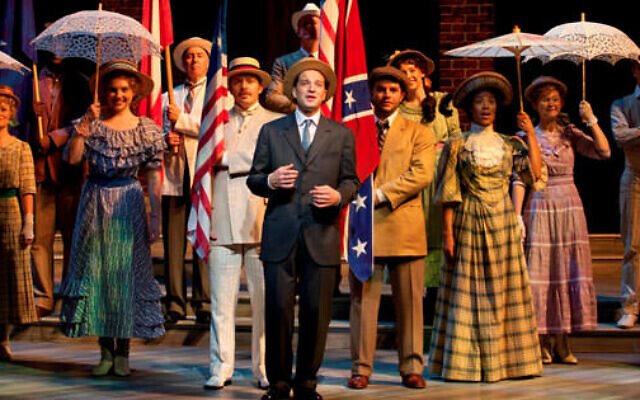Parade’s Composer Revisits His Broadway Hit
Jason Robert Brown wrote the music and lyrics for the Broadway musical, “Parade,” about the Leo Frank trial.
The 1998 musical, “Parade,” was revived last fall for a short run at New York City Center Theater to a glowing review in the New York Times. Theater critic Juan Ramirez described it as delving “further in America’s history of violence and delivers the best sung musical in many a New York season.” It soon moved to Broadway where it still plays to sold out houses.
When it premiered, the story, about the trial and conviction of Leo Frank in 1913 and his subsequent lynching in 1915, was panned by Times’ critic Vincent Canby. He called the staging by acclaimed director Harold Prince at Lincoln Center…“without life. It plays as if it were still a collection of notes for a show that has yet to be discovered.”
Some might ask whether the two reviewers saw two different shows, but the composer of the musical, Jason Robert Brown, had his own thoughts when he came to Atlanta on April 11 to discuss his work. The program at the Alliance Theater was sponsored by Neranenah, the Atlanta Jewish music festival and culture series.

Brown told Neranenah’s executive director, Joe Alterman, and the Alliance Theater’s producer and casting director, Jody Feldman, that the critical turnabout might have had a lot to do with the political tenor of the times. The year 1998, he remembers as a time of optimism for liberal America.
“In 1998, we were at the end of the Clinton terms. And so, for us, it was good to be liberals. Everything was sort of moving upwards. You know, we were on the upswing. Everything was going OK. And we had made advances and we were all in a very good country. We were doing things well. And of course, there were a vast swath of the country that did not think that at the time, but we were not among them.”
In 1998, we were at the end of the Clinton terms. And so, for us, it was good to be liberals. Everything was sort of moving upwards. You know, we were on the upswing. Everything was going OK. And we had made advances and we were all in a very good country. We were doing things well. And of course, there were a vast swath of the country that did not think that at the time, but we were not among them.
But over two decades later, Brown says all that changed and, as he was quick to state, not for the better.
“Parade” recalls the virulent antisemitism that surrounded the Frank trial in the summer of 1913, in the days before room air conditioning.
Crowds jammed the streets outside the courtroom, listening to the trial and making their presence known to the judge and jury.

When Brown, who grew up Jewish in New York City, wrote the music to the show, he was a 28-year-old newcomer to Broadway, who had become a protege of the director, Prince. He relied largely on several lengthy conversations with Alfred Uhry, the Atlanta native, who remembered the impact of memory of the trial and Frank’s lynching on Atlanta Jewish community, particularly those community leaders who were members of The Temple, one of the city’s most influential Jewish institutions.
The New York Times reviewer last fall took note of Uhry and Brown’s attempt to recreate some of the tensions that existed everywhere at the time and how they are reflected in our own… “subtlety need not be the name of the game these days.” Ramirez wrote.
“This country’s ongoing procession of racism, antisemitism and law-and-order politicians comes awfully close to the hate-filled climate of the work’s setting, shedding any pretense of respectability.”
Brown brought his own ideas to “Parade,” and, as he relayed them in his conversation at the Alliance, he saw the Frank case as part of a more complex political setting.
“I try to be very careful in talking about the politics of ‘Parade,’” Brown said. “I always mention that the Jews of Atlanta do not get a pass from me in terms of their complicity in very serious anti-Black racism that went on at the time. There’s no question that a lot of the stuff that was said by his own lawyers at the trial, vile, horrible, horrible stuff. So, I don’t ever want to be on the side of people who are like, oh, Leo Frank was you know, he was such a great guy.”
Brown admits that he wrote the music and lyrics to Uhry’s libretto without the benefit of Steve Oney’s impressive retelling of the Frank trial in his book, “And the Dead Shall Rise,” that came out five years after “Parade” was first staged. The book, by the former reporter of the Atlanta Journal Constitution, was based on what he claimed were 17 years of research and a considerable amount of original reporting, including how the conspiracy to murder Frank was planned by some of the leading citizens of Marietta.




comments